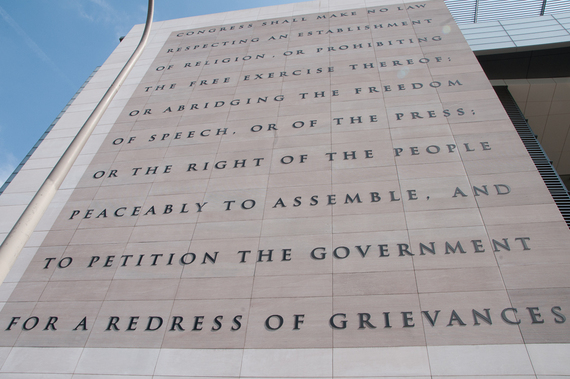Here we are in the season to celebrate our nation's founding principles, and 33 percent of Americans can't name any of the five freedoms of the First Amendment. That's the latest finding from the Newseum Institute's annual survey on the State of the First Amendment. The authors of the Bill of Rights would likely be disappointed that so many of us are still not paying close attention to the words they negotiated so carefully almost 225 years ago.
But, should our populist ancestors be keeping up with the news, the more unsettling finding could be that only 57 percent of us named Freedom of Speech as a First Amendment right. It wasn't easy for our forebears to exercise their right to free speech, living as they did in a time when access to information was limited to the educated elite, and those who felt strongly about an issue needed a soapbox, a friend with a printing press, and quite a bit of courage. Today, thanks to the Internet and the laptops, tablets, and smart phones that give us instant and ubiquitous access, almost everyone has information and the means to talk about it. Our ancestors would be saying, What's holding you back? Speak up!
We can't really blame our social studies teachers if we didn't grasp the point when we were still in grade school. Who could have known that the local town square would so soon morph into a global information marketplace, and the skills and abilities we need to effectively exercise our rights would be transformed as well? A bullhorn and a soapbox won't do it anymore; making oneself heard requires knowing how to put together a message, target an audience, select a media, create infographics, produce content, tweet/post/share, engage with online commenters and pundits.
No worries. A great thing about the Learning Economy of 2015 is that it keeps up. We can master what we need to know to get our points across anytime, anyplace, and at any pace, 21st Century style. This means learning in a new way - getting hands-on, technology-enabled, experiential, outside the schoolhouse walls. Here are seven programs that can help us out, all of which are either free or inexpensive.
YouTube Creator Academy helps individuals learn to speak up by creating effective videos and developing YouTube channels to get their messages across. There are 14 courses and 63 lessons on topics such as how to create great content, developing production skills, using lighting and camera, building and engaging an audience, and making money with YouTube.
Coursera offers an online course on public speaking, taught by faculty at the University of Washington. Through "18 hours of videos, quizzes, and peer assignments," students can learn about making and delivering a good argument, developing impromptu speeches, informative speeches, and speaking persuasively.
SlideShare is a show-and-tell, peer learning platform for everyone - from communications professionals to regular folk - who wants to use creative slide presentations to enhance their message. In the Presentations and Public Speaking category, you can find recent titles such as "10 Ways to Know If Your Speech Sucks" and "5 Ways to Make the World Stop and Listen to You."
The Gig Economy is the resource for those who want to hire someone to articulate their message for them. Freelance writers, speechwriters, and content crafters are available through Freelancer.com and Contently.net - both of which connect the talented people who work with them to continuous learning resources. For the customer with a script in hand, YouTube has more than 60 videos available to teach effective delivery.
Google has opened a new online News Lab to make it easier for journalists (citizen journalists, as well) to access information and develop data-driven messages. This is an amazing resource for facts and figures, maps, satellite imagery, charts, surveys, access to research and analysis in print. Along with it come short online learning modules so that we know how to use what's available.
To help young people learn to express themselves in writing, there's 826, a national organization with seven big-city chapters. The Washington DC Chapter is located at the Museum of Unnatural History and will serve more than 4,000 youth aged 6-18 in 2015. Among the featured courses this summer: "Make Your Own Comic," "Whodunnit? A Mystery Writing Workshop," and "Everyone's a Hero: A How-To Guide."
WikiHow offers the quickest and most accessible tutorials on speaking up and out effectively, with 37 short learning modules available on topics related to speaking and listening skills alone. Several of them have had hundreds of thousands, if not millions, of views, including "How to Speak Your Mind," "How to Influence Others," and "How to Communicate Effectively."
The learning is easy, but here's the hard part. Now that every one of us can be informed and all of us can develop the skills to express ourselves, speaking up is more than a right - it is a responsibility. Dick Costolo, who stepped down as CEO of Twitter just last week, challenges us this way: "Thanks to the increasing pervasiveness of the internet and the growth of platforms like Twitter, access [to information] has become available at a larger scale than ever before. ... Use this access responsibly and with empathy. Use it to shine a light on what's good in the world and what needs to be changed, to champion the under-served, to embrace people's differences, and amplify the best of humanity."
That would be yet another mind-blowing observation for the authors of the Bill of Rights. What do we have to say about it?
